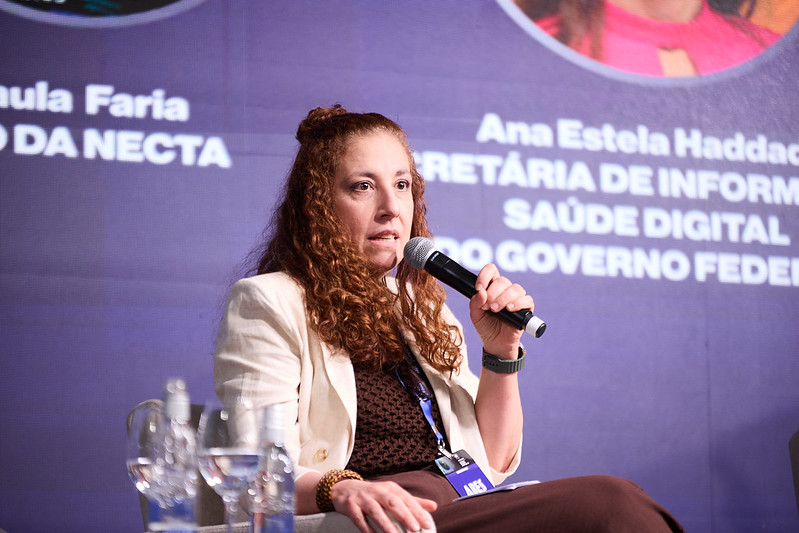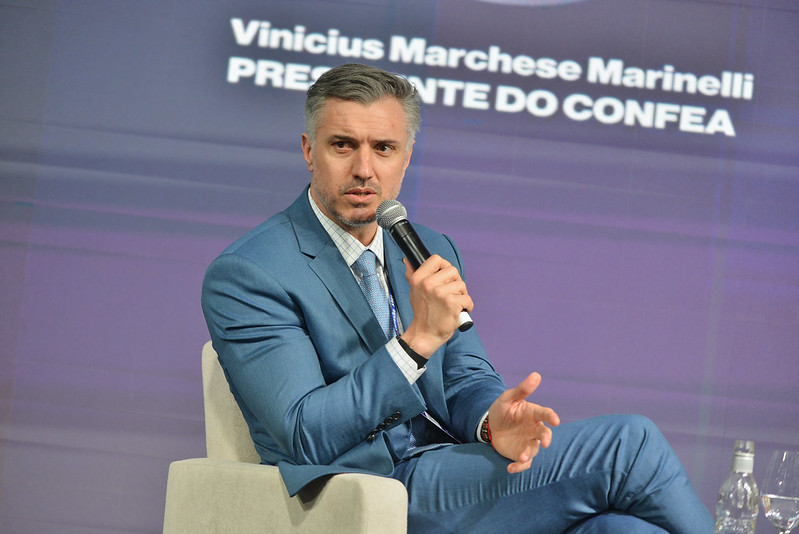
The seventh panel of the ABES Summit 2025, "AI as a Cross-Cutting Force in Business," brought together experts to discuss how artificial intelligence can be applied responsibly in strategic areas such as healthcare, urban mobility, and public policy. The panel was moderated by Jamile Sabatini Marques, Director of Innovation, Development, and Research at ABES and the ABES Think Tank – Center for Intelligence, Public Policy, and Innovation.

AI at the service of the population
At the opening ceremony, Paula Faria, CEO of NECTA and creator of P3C and Connected Smart Cities, emphasized that AI must be at the service of the population. "A city is only truly smart when technology reaches everyone," she stated, advocating for public management based on evidence and accessible data. According to her, inclusion is a key factor in applying AI in urban environments. "There's no point in talking about technology if it's not accessible. Data and artificial intelligence have the potential to transform areas such as urban mobility and healthcare, but they only make sense when they're at the service of the population," she added.

Highlighting Ana Estela Haddad and digital health
One of the panel's most memorable moments was the participation of Ana Estela Haddad, Secretary of Information and Digital Health at the Ministry of Health. She presented the progress made in the digital transformation of the Unified Health System (SUS), which began with the creation of the secretariat in 2023. "This is a government-wide initiative. We have collaborations across several departments and a committee in the Civil House to consider this integration. The goal is to strengthen the principles of the SUS, such as universality and equality of access," she explained.
Ana Estela highlighted that the National Health Data Network (RNDS) has grown by more than 3,00% in the last two and a half years, surpassing 3.1 billion records. This robust infrastructure enables actions such as predicting health emergencies, personalizing clinical care, and accessing medical record histories. "Today, we can predict pandemics and epidemics based on population and genomic data. This places us on a new level of management and innovation," she stated.
She also detailed structural actions underway at the Ministry of Health to enable the use of AI: changes to digital infrastructure, implementation of a data governance policy, and experimental projects such as centralized drug purchasing using intelligent algorithms. "Artificial intelligence is a powerful tool, but it only delivers real results when there is human capital prepared to use it. We need to train professionals and also qualify the system's users," she reinforced.

Talent training as a priority
Vinicius Marchese Marinelli, president of CONFEA, complemented the panel by addressing the importance of talent development to sustain this transformation. "We have an ecosystem with many interfaces, and engineering is at the center of it. But we face a serious problem: low demand among young people for engineering courses. We need to attract this generation born with technology to public service, which will be most impacted by the lack of qualified professionals," he warned.
Vinicius argued that the country needs to treat talent development as a state policy. "Portugal has already realized this and is changing the course. Brazil needs to do the same. If we don't address this now, we'll have a serious problem in 20 or 30 years," he concluded.
AI with purpose and inclusion
The panel concluded that AI is a cross-cutting force capable of transforming Brazil—as long as it is guided by ethical principles, digital inclusion, and well-structured public policies. Ana Estela Haddad's participation highlighted that public health is already on this path, with concrete actions, a strategic vision, and a focus on equity. Artificial intelligence, when applied purposefully, can be the key to a more just, efficient, and connected future.
About ABES SUMMIT
The 15th edition of ABES SUMMIT, held in October 8th at the JW Marriott, in São Paulo, had as its central theme “Digital Frontiers – Geopolitics, Technology and Sustainability”. The event promoted a day of immersion for CEOs, leaders and government representatives, aiming to highlight the power of technology to accelerate business and economic transformation. In a scenario of global recalibration where technology and geopolitics intertwine, the ABES SUMMIT discussed practical strategies to address challenges such as the dominance of Artificial Intelligence (AI) and Agentic AI, a cybersecurity global, regulation and public policies, and the qualification of workforce. The focus was on the strategic role of Brazil, which can establish itself as a global protagonist in energy transition, in the preservation of biodiversity and digital advancement, due to its clean matrix and innovation ecosystem. The ABES SUMMIT 2025 featured free online broadcast it's the BMV seal, offsetting 100% of environmental impacts.
Sponsors: ApexBrasil, Finep, Embrapii, Kaspersky, Nic.br, Caesbra Benefits, Banco do Brasil, Devfy and Digiforte.
Watch the ABES SUMMIT 2025 panels: https://youtube.com/playlist?list=PL2X1JJqBpAkMM7gQhOIAmH9pZwpIG4jQ8&si=i4xIh0sAI-kunjvj

















